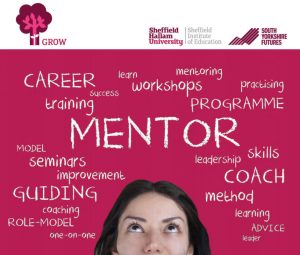GROW Programme Evaluation – Phase 1: June 2020 – September 2021
Authors: Dr Richard Pountney, Dr Josephine Booth and Robbie Campbell
25 November 2021
In July 2020 the GROW Programme was developed in response to the disruption to schooling caused by the COVID-19 pandemic. It provided a platform for pupils, graduate mentors (GMs), and schools to connect and thrive, involving 25-hour training for graduates in mentoring, and a 15-hour mentoring programme for Y10 and Y11 pupils in South Yorkshire schools. Following the pilot it was rolled out and developed further in November 2020 and the offer extended to all Barnsley schools, including Y13s, in February 2021. This evaluation of the first phase of the GROW Programme, June 2020 to September 2021) aims to identify the efficacy of its design and delivery in order to improve its outcomes, and to disseminate the benefits of the model, within SHU and externally via journal papers and conferences. It examines graduate mentors’ perceptions of the training programme and its benefits, including those related to graduate attributes and employment. This includes the skills and knowledge of mentoring that graduates have gained in the mentoring programme, and how the programme has supported graduate readiness for their next step in their career, including the specific aspects of the programme and work with pupils that influenced their decisions.
The effects of the mentoring programme on pupils are also examined, in terms of the recovery of learning, including the agency of mentors in supporting pupils to develop their confidence, habits of work and learning, and metacognitive strategies to meet the needs of assessment at a crucial stage in their school careers. Analysis draws on the perceptions of school staff of the effects on pupils’ participation in the programme and engagement with learning. This research will inform the future development of this form of intervention and the programme design and its effectiveness.
The research questions guiding this evaluation are:
- What skills and knowledge have graduates gained in the training and mentoring programmes and how has it supported their readiness for the next step in their career?
- How do mentors and school staff perceive the effects of the mentoring programme on pupils’ re-engagement with learning?
- How effective is the design of the programme in preparing graduates for working with pupil mentees and how is online mentoring perceived as a method of building trust and encouraging dialogue?
The report includes many accounts, from mentors, school staff and the pupils themselves, of the positive effects of the programme. The general findings and recommendations are summarised below.
Summary of findings and recommendations
The skills and knowledge graduates gained in the training and mentoring programmes and how it has supported their readiness for the next step in their career
GMs expressed strong agreement on the positive effects of both the training and the mentoring experience on skills and knowledge and how this has prepared them for the next step in their careers. There is anecdotal evidence of a considerable number of students reporting success in finding employment and oft being able to talk about their experience in their applications and at interview. Recommendation 1: track graduate mentors next steps and follow up in 6 months
GMs reported the importance of a team ethic, using WhatsApp to share ideas and support each other. They valued the contribution of mentors who have been involved in previous cohorts as providing the ‘real’ experience of mentoring. Recommendation 2: encourage experienced mentors to take part as mentoring ‘buddies’ in the training and working alongside new mentors in schools.
The 14 GMs that completed the Postgraduate Certificate reported higher levels of insight on their training and mentoring practice and were able to deepen their professional knowledge and to gain academic credit for this work. The first cohort were able to test and demonstrate proof of concept.
Recommendation 3: revise the PG Certificate, building on the success of the first cohort, and offer to all GMs participating, to provide professional recognition for their mentoring practice and to raise the status of this professional role.
The effects of the mentoring programme on pupils’ re-engagement with learning
Schools were impressed (and pupils grateful for) the GMs’ ability to be flexible in their approach and to adapt the materials to the needs of the learners.Recommendation 4: provide more time in the training for GMs to become familiar and practised in the use of the materials and provide case studies to illustrate how the materials can be used, including those for trauma-informed approaches.
It is clear that the curriculum provides a structure and a focus, reinforcing the metacognitive and self-regulative principle that guides the programme, and the requirement that metacognition needs to be about something. However, the busy nature of schools meant that pupils missed sessions, affecting continuity. Recommendation 5: provide criteria for GMs to support decisions on both accommodating gaps in the sessions and the minimum requirements for pupils to achieve digital badges and the certificate of completion.
The perceptions of school staff of the effects on pupils’ participation in the programme and engagement with learning include increased confidence, a greater sense of belonging, improved habits of work and learning and academic resilience. This is supported by the accounts of pupils and in the analysis of the completed workbooks. Recommendation 6: provide guidance and support for the analysis of recorded sessions by individual GMs, and across the cohort, using the tools available in the Bramble platform.
The effectiveness of the design of the programme in preparing graduates for working with pupil mentees and how online mentoring as a method of building trust perceived.
Issues reported by GMs include the practical issues of timetabling and using the resources, as well as the time pressures on managing the mentoring sessions. Recommendation 7: introduce a mentor tracking system that reduces the pressure on GMs to keep records, and which logs pupil attendance, workbook progress and badge awards. This can also feed into an overall spreadsheet which shows progress across all settings and gathers statistical data.
The three-way design of the programme, linking mentors, the pupils and key school staff, was a crucial element in the success of the programme and in building trust and rapport. Where the school contact was able to communicate and meet with the GMs regularly a higher level of completion by pupils was seen. Recommendation 8: disseminate the effects of the programme to schools at the initial liaison meetings, alongside the level of commitment needed in terms of time and responsibilities and support the school staff in this role, and emphasise the importance of the weekly meetings between SKC and GM.
Further development of the programme
Recommendation 9: appoint a full-time member of academic staff to oversee the coordination of the programme and a Project Manager to manage the administration, including a central record of weekly school meeting, as well as recording receipt of school compliance documentation.
The intention is to run further cohorts in South Yorkshire schools in 2021-22 that take forward these recommendations and build on the success of the programme. A further evaluation of the GROW programme and its impacts will build on this report and examine further its impact.
Recommendation 10: further evaluation of GROW should be made to examine the pupil-mentor interactions, pupil learning and the development of graduate attributes
Download the report


